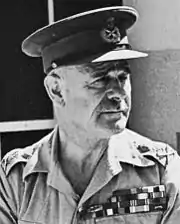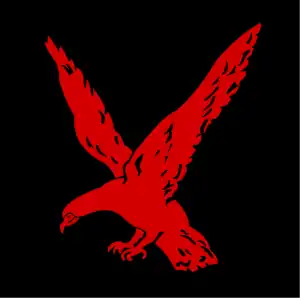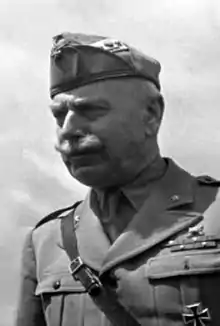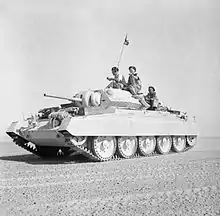Operation Battleaxe (15–17 June 1941) was a British Army offensive during the Second World War to raise the Siege of Tobruk and re-capture eastern Cyrenaica from German and Italian forces. The offensive's failure led to the replacement of British General Sir Archibald Wavell, Commander-in-Chief Middle East, by Claude Auchinleck; Wavell took Auchinleck's position as Commander-in-Chief, India.
British and Commonwealth Forces

Gen. Archibald Wavell

Cruiser tank Mk I
Commander in Chief, Middle East
General Archibald Wavell
- XIII Corps
- Lieutenant-General Noel Beresford-Peirse
 7th Armoured Division
7th Armoured Division- Major-General Michael O'Moore Creagh
- 4th Armoured Brigade (Brigadier Alexander Gatehouse)[lower-alpha 1]
- 4th Royal Tank Regiment (Matilda tanks) (Lieutenant-Colonel Walter O'Carroll)
- 7th Royal Tank Regiment (Matilda tanks) (Lieutenant-Colonel Basil Groves)
- 7th Armoured Brigade (Brigadier Hugh Russell)
- 2nd Royal Tank Regiment (Mk I, II and III/IV Cruiser tanks)
- 6th Royal Tank Regiment (Crusader tanks) (Lieutenant-Colonel Leonard Harland)
- 7th Support Group (Brigadier John Campbell)
- 1st, 3rd, 4th, and 106th Regiments Royal Horse Artillery
- 1st battalion, King's Royal Rifle Corps
- 2nd battalion, Rifle Brigade
- Divisional troops
- 11th Hussars (Reconnaissance regiment) (Lieutenant-Colonel William Leetham)
- Engineers
- 4th Field Squadron, RE
- 143rd Field Park Squadron, RE
- 4th Armoured Brigade (Brigadier Alexander Gatehouse)[lower-alpha 1]
 4th Indian Infantry Division
4th Indian Infantry Division- Major-General Frank Messervy
- 11th Indian Infantry Brigade
- Brigadier Reginald Savory
- 2nd battalion, Queen's Own Cameron Highlanders
- 1st battalion, 6th Rajputana Rifles
- 2nd battalion, 5th Mahratta Light Infantry
- 22nd Guards Brigade
- Brigadier Ian Erskine
- 1st battalion, Buffs (Royal East Kent Regiment)
- 2nd battalion, Scots Guards
- 3rd battalion, Coldstream Guards
- 22nd Guards Brigade Attack Company
- Divisional troops
- Central India Horse (Reconnaissance regiment)
- 25th Field Regiment, RA
- 31st Field Regiment, RA
- Engineers
- 4th, 12th, 18th, and 21st Field Company (sappers and miners)
- 11th Field Park Company
German and Italian forces

Gen. d'Arm. Italo Gariboldi
.jpg.webp)
Genlt. Erwin Rommel

Damaged German 150mm self-propelled howitzer in North Africa
Comandante Superiore
Generale d'Armata Italo Gariboldi[lower-alpha 2]
- Deutsches Afrika Korps
- Generalleutnant Erwin Rommel
 15th Panzer Division
15th Panzer Division- Generalleutnant Walter Neumann-Silkow
- 8th Panzer Regiment (Oberstleutnant Hans Cramer)
- 1st Battalion (Hauptmann Johannes Kümmel)
- 2nd Battalion
- 1st Battalion of the 104th Motor Infantry Regiment (Wilhelm Bach)[lower-alpha 3]
- Reconnaissance Battalion 33
- 1st Abteilung of the 33rd Artillery Regiment
- 33rd Panzerjäger Battalion (12 50 mm (1.97 in) PaK 38 and 21 37 mm (1.46 in) PaK 36 anti-tank guns)
- 15th Motorcycle Battalion (Hauptmann Curt Ehle)
- One anti-aircraft battery (with 13 88 mm (3.46 in) FlaK 18 and 36 anti-aircraft guns)
- 8th Panzer Regiment (Oberstleutnant Hans Cramer)
 5th Light Division
5th Light Division- Generalleutnant Johann von Ravenstein
- 5th Panzer Regiment
- 3rd Reconnaissance Battalion
 102nd Motorised Division "Trento"
102nd Motorised Division "Trento"- Generale di Divisione Luigi Nuvoloni
- Three infantry battalions and one artillery regiment (stationed at the Sollum-Musaid-Capuzzo area)
- Korps troops
- Two regiments Italian artillery (stationed at Bardia)
- One regiment FlaK (88 mm guns)
Notes
- ↑ The 4th Armoured Brigade was under the effective command of Masservy's 4th Indian Infantry Division
- ↑ The Comandante Superiore was Rommel's superior during the campaign.
- ↑ Stationed at Halfaya Pass
Bibliography
- Pitt, Barrie (1989). The Crucible of War: Western Desert 1941. New York: Paragon House. ISBN 1-55778-232-6.
- "The Development of German Defensive Tactics in Cyrenaica—1941". The Lone Sentry. Retrieved December 11, 2022.
- "Reasons for the failure of Battleaxe". Panzer Abwehr Blog. Retrieved December 11, 2022.
This article is issued from Wikipedia. The text is licensed under Creative Commons - Attribution - Sharealike. Additional terms may apply for the media files.

